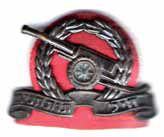
On May 4th 1967 I left Israel for Copenhagen to attend a furniture exhibition. There were no special concerns either on the political or on the security fronts. Israel was beginning to emerge from a recession which had begun in 1965. A few months prior there had been a meeting between Egypt, Syria and Jordan, and a decision to form a joint command had been made. Not so unusual in the Middle East.
To the world’s surprise on May 8th, Nasser announced a blockade of the Straits of Tiran at the entrance to the Red Sea. Eilat, at the northern end of the Red Sea, alongside Aquaba, Jordan’s sole port, had by this time become an important port. It was Israel’s gateway for trade with the Far East and east coast of Africa. A few days later Nasser requested U Thant, the United Nations Secretary General, to remove the UN peacekeeping force from Gaza. To Israel’s surprise and dismay U Thant agreed and within days they were gone. With the removal of the UN force Nasser moved 1,000 tanks to the northern border of the Gaza strip, less than 25 km from Ashdod and about 60km from Tel Aviv. This was tantamount to a declaration of war.
I had been kept informed of these developments by my concerned Danish friends during the furniture fair. In addition I was phoning Israel and had learnt that there had been a total call up of the reserves, that all windows were being taped against bomb blast and preparations for blackout were under way. The situation was very grave. I froze all shipments to Israel and issued instructions to the factories to put all our orders on hold. I returned earlier than planned and arranged for my wife, Tamara, to fly to Argentina. On my return I was amazed at what I found. It was almost like another country.
There were military roadblocks at most intersections. Not only were our men called up but also all commercial vehicles and trucks, including our own, were gone. I spent a day at the company installing an emergency plan and the next day I was with my unit. By this time, in part due to increasing public pressure, the Prime Minister, Levi Eshkol, handed over the defense portfolio that he held to Moshe Dayan.
Dayan, a brilliant military strategist, wasted no time. To him it was clear that the country was on the verge of war. To confuse Nasser, and get him to lower his guard, he immediately sent half the reserves back home. Parallel to this move, and in consultation with the top military brass, they prepared for a surprise military attack. The centerpiece was the role of the Israel Air Force which would sweep in to destroy the enemy aircraft whilst they were still on the ground. Eshkol had previously instructed an Israeli cargo vessel in Durban to set sail for Eilat to challenge Nasser’s blockade. Dayan instructed the vessel to turn back; he had no interest in testing Nasser’s resolve.
When I went to join my unit I had taken my small Mini with me. The unit consisted of fifty upgraded old World War II Sherman tanks with the necessary auxiliary and support equipment. I was part of the forward supply chain responsible for diesel fuel. We were hidden in the forests around Yokneam awaiting orders. Having the Mini, I was able to go up to the village to use the phone and stay in touch with my office. In this situation I was also able to take and receive messages for my fellow troopers.
The days passed slowly by and we were beginning to feel restless. Then at midday on Monday, June 5th we received marching orders. I had enough time to drive up to the village where I had become acquainted with the owner of a modest coffee shop. I parked the Mini outside and gave him the key. I had brought with me one of the dispatch riders on his motorbike to take me back to our unit.
Moving a tank division is no simple task. By the time the convoy started to move it was already late afternoon. The news of the successful Israeli air strikes early the same morning was purposely kept under wraps. The supply division followed behind the tanks. I was lying perched on top of barrels of diesel oil loaded on the back of a commercial truck. Above the cab was a large sign with the name Elite, a food producer. It was one of many motley trucks all moving forward at a snail’s pace with soldiers spread out on top of the barrels. From Yokneam the convoy swung east heading in the direction of Megiddo, an archeological site dating back to the Roman occupation. We passed the site and continued to move east eventually stopping at Kibbutz Givat Oz at about 11p.m. The kibbutz was on the West Bank border, then under Jordanian occupation.
We were there for only a short time when two fighter planes passed by, spotted us and swung around. At first we thought they were ours. In fact they were Jordanian Hunter jets. About fifty meters behind the area where we were parked was a hillock. As the jets came screaming towards us they dropped their payload and the hillock disappeared as they swooped over our heads with their cannons blazing. All I could do was bury my head in my sleeping bag. When the dust had cleared, there was miraculously only one soldier seriously wounded and three others lightly wounded. There were two bullet holes between the E and the L of the Elite sign. Had they dropped their payload one quarter of a second later the damage would have been horrendous. My lasting impression of this is the speed with which things happen in modern warfare. There was no time for me to get down from my perch, let alone run for cover. Within fifteen seconds it was all over.
As the war progressed we saw the charred remains of several Jordanian convoys which had been spotted, attacked and totally destroyed by our aircraft. The advantage of our ascendancy in the air was apparent.
The next day the battle of the tanks alongside Jenin was in full swing. It was over by late afternoon. We lost 19 Shermans and, more critically, suffered 31 fatalities. The Jordanian Arab Legion, officered partially by British officers, had put up a brave fight before conceding defeat after suffering heavy losses. We hardly had time to catch our breath as the advance continued towards Nablus. We were advancing so fast that food supplies were not reaching us. The immediate solution was to break into food stores on route. As the only one in our group who was familiar with English food and brands they made me the unit’s culinary advisor. On Wednesday, after we had passed Nablus on our way to the Jordan river, a ceasefire with Jordan was declared. We received orders to turn back and proceed towards the Golan Heights.
Late Thursday afternoon we arrived at Kibutz Yizrael, south-east of Afula, and I took advantage of the opportunity to get a dispatch rider to take me to the Afula post office to send off a few cables to South Africa and Argentina to say “don’t worry, we are alive” and to phone the family and office in Israel. I learnt that there had been air raids and blackouts had been ordered. The lady in the post office would not hear of payment. There was a wonderful feeling of excitement and elation – a feeling of brotherhood.
Descending towards the Sea of Gallilee, we passed through the village of Poriah where we were welcomed as heroes by the residents at the sides of the road who were handing out cakes and sandwiches. On Saturday we camped in a forest near kibbutz Dafna where we were honored with a helicopter visit by Prime Minister Levi Eshkol. The news emerging from all three fronts could not have been better. The Egyptians had lost hundreds of tanks and been forced to retreat in complete disarray. The Jordanians, to whom we had appealed before the outbreak of hostilities to remain neutral, had been persuaded by Nasser to join the war. As things worked out the Jordanians were the biggest losers, losing East Jerusalem and the entire West Bank.
On the Sunday we climbed the Golan Heights and set up camp in Massada. Five days later we were moved south to Kunetra, a small town on the Syrian border. We were stationed just outside the town in what had been a Syrian army camp. Following the Syrian defeat the camp had been evacuated. The monotony was broken by a visit from the famous Israeli singer, Shoshana Damari. She was wonderful and her performance was greatly appreciated by all of us. We remained on the Golan Heights for about three weeks.
We formed a small group of nine men who shared a room. One of the group was a Yemenite who was an excellent cook. He used to collect enough food from the kitchen for the whole group and prepared and cooked it for us. The result was excellent as he had his heart in the cooking and we covered for all his other duties. We were required to do guard duty and were in a state of constant alert. We had negotiated a ceasefire with the Syrians but were aware of terrorist elements and being on the border meant being extra careful. There was only one young guy in our group – he was about 23.
I got my first two-day home leave twenty days after the start of the war. An army truck took us back to our base camp near Yokneam. The journey took about four hours. I got a lift up to the village and arrived at the coffee shop a little after ten at night. The owner’s reaction was spontaneous. He rushed towards me crushing me with his warm embrace. Apparently almost all of the local boys had been on leave and he had feared the worst for me. Apart from a broken side mirror and very low tires, the car was fine. He insisted on feeding me and on no account would he take payment.
I drove slowly to a service station nearby and made my way home. The two days went by very quickly. I decided to take the car back with me. This gave me the opportunity to explore the Golan Heights and share the experience with my army mates. I had almost a week to explore and managed to discover the beauty of the area. Eight days later we were brought back to our base camp in Yokneam and discharged.
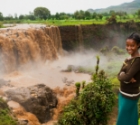 A “Virtual” tour of Ethiopia
A “Virtual” tour of Ethiopia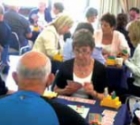 ESRA Herzliya’s Annual Bridge Morning
ESRA Herzliya’s Annual Bridge Morning Walking for Benji
Walking for Benji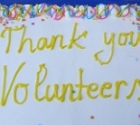 A new website in English - on Volunteering - Launched in Israel
A new website in English - on Volunteering - Launched in Israel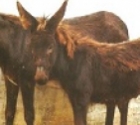 Help Needed for Abused Horses and Donkeys
Help Needed for Abused Horses and Donkeys Heather's Heseg
Heather's Heseg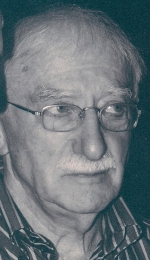 Geoff Tollman
Geoff Tollman